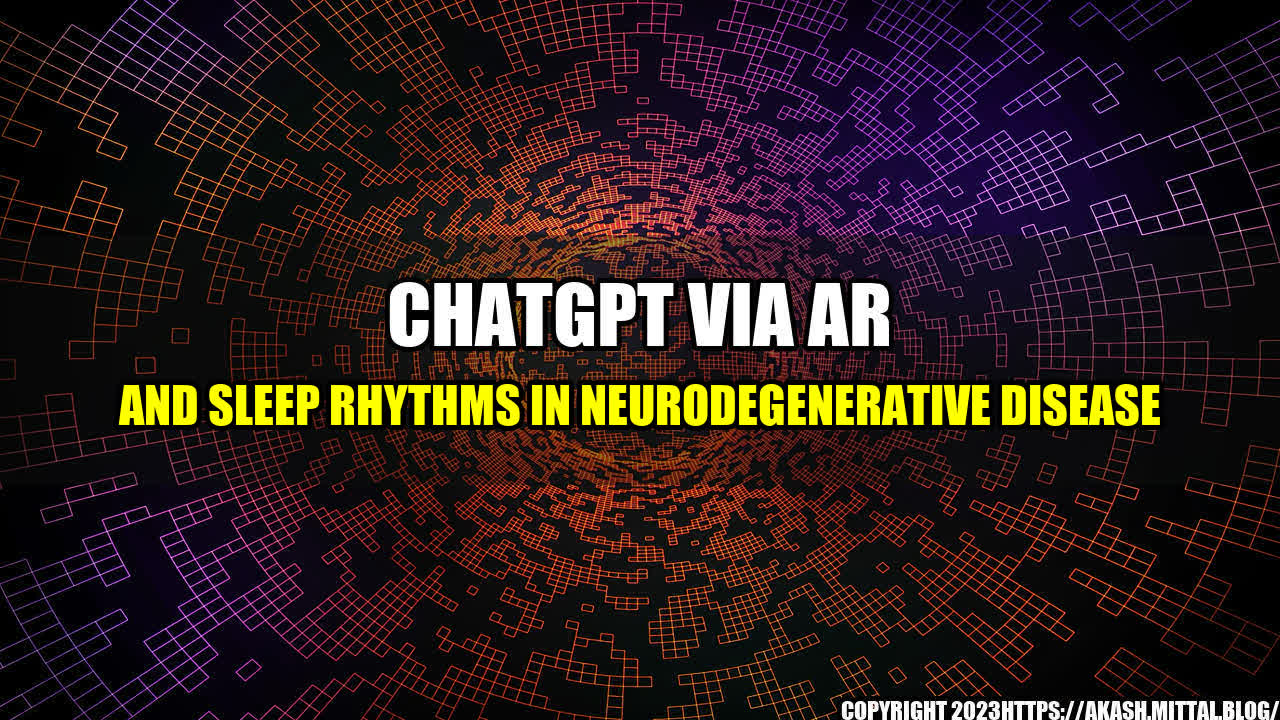
Imagine waking up in the morning, feeling refreshed and energized after a good night's sleep. Now, imagine that your loved one wakes up feeling confused, disoriented, and unable to remember basic things. This is the reality for many people living with neurodegenerative diseases such as Alzheimer's or Parkinson's Disease. One factor that can exacerbate these symptoms is poor sleep quality and disrupted sleep patterns.
Researchers have been studying the connection between sleep and neurodegenerative disease for decades. In recent years, technology has advanced to the point where augmented reality (AR) can be used to monitor and improve sleep patterns. This article will explore the use of AR and sleep rhythms in neurodegenerative disease.
Sleep is essential for our physical and mental health. During the night, our bodies go through several sleep cycles that involve deep, restorative sleep and REM (rapid eye movement) sleep. These cycles are important for our immune system, tissue repair, and cognitive function. When we don't get enough good-quality sleep or our sleep is disrupted, it can lead to a host of health problems, including depression, anxiety, heart disease, and neurodegenerative disease.
Research has shown that there is a clear link between poor sleep and neurodegenerative disease. People with Alzheimer's and Parkinson's Disease often suffer from disrupted sleep patterns, including difficulty falling asleep, waking up frequently during the night, and feeling tired during the day. This lack of sleep can exacerbate their symptoms, including memory loss, confusion, and tremors. In some cases, it may even accelerate the progression of the disease.
One reason for this connection is that during deep sleep, the brain clears out waste products that can build up during the day. This waste removal system, called the glymphatic system, is less effective when we don't get enough good-quality sleep. Over time, this can lead to the accumulation of beta-amyloid plaques, which are a hallmark of Alzheimer's Disease.
Augmented reality (AR) technology has the potential to revolutionize the way we monitor and improve sleep patterns in people with neurodegenerative disease. AR involves overlaying digital information onto the real world using a headset or smartphone app. In the context of sleep monitoring, AR can be used to track movement, heart rate, and other sleep-related data without the need for invasive sensors or wires.
One example of this technology is the Dreamlight Pro AR sleep mask. This mask uses sensors to monitor sleep patterns and provide personalized recommendations for improving sleep quality. It also includes a built-in AR system that can provide guided meditation, relaxation exercises, and other sleep-promoting content.
Another example of AR sleep monitoring is the Nightowl Sleep Coach app, which uses AR to track movement during sleep and provide personalized sleep recommendations. The app can also be used to set goals and track progress over time. Other AR sleep monitoring apps include SleepScore and SleepWatch.
One study conducted at the University of Washington found that AR sleep monitoring was highly accurate and comparable to traditional polysomnography (PSG), which is the gold standard for sleep monitoring. The study involved 13 participants with Parkinson's Disease who were monitored using both AR and PSG methods. The researchers found that the AR system was able to accurately detect sleep stages and movements, providing valuable insights into the participants' sleep patterns.
In conclusion, the use of AR technology for sleep monitoring in people with neurodegenerative disease shows great promise for improving the quality of life for millions of people around the world. By tracking sleep patterns and providing personalized recommendations for improving sleep quality, AR can help to alleviate some of the symptoms of neurodegenerative disease and slow down their progression. While more research is needed in this area, the potential benefits of using AR for sleep monitoring are clear.
3 key takeaways:
Category: Health
Curated by Team Akash.Mittal.Blog
Share on Twitter Share on LinkedIn